Protest

I walked through ash and glass as neighbors and community members swept up the remnants of our neighborhood. The night before, flames touched sky in all corners of our city as news and police helicopters hovered overhead. The city was Los Angeles. The year was 1992, and it was the third day after the police who beat Rodney King were acquitted by an overwhelmingly white jury in Simi Valley.
That was the day I was introduced to the words of Jeremiah 29:7: “But seek the peace of the city where I have sent you into exile, and pray to the Lord on its behalf, for in its peace you will find your peace.”
On Monday, Maryland Gov. Larry Hogan called in the National Guard and Baltimore Mayor Stephanie Rawlings-Blake declared a citywide curfew to quell violence that erupted in Monument City following the funeral of 25-year-old Freddie Gray. Gray died a week after sustaining a nearly severed spinal cord after being detained by police on April 12. The reason for the stop? Gray ran after making eye contact with police. An investigation is ongoing — while the people of Baltimore and beyond demand justice.
The images of fires rising over the Baltimore landscape were eerie, as it was only a few months ago that the nation sat glued to television sets watching the small town of Ferguson, Mo., erupt. And I fear we are becoming numb to it. We turn the TV on to watch our favorite reality show. We see chanting, running black people, and we think: again? Then we turn back to The Voice.
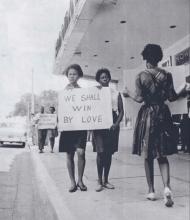
"We do not see things as they are. We see things as we are.” This Talmudic quote from Rabbi Shemuel ben Nachmani notes that seeing is not always vision. What we see in life is more than what the eye beholds. A person or circumstances right in front of us can be merely the surface of someone or something more profound.
The United States must forever recall the struggles, moves, and marching of the women and men across the Edmund Pettus Bridge. Fifty years ago, ordinary people walked for the right to stand up and be counted. To the naked eye, those sojourners lacked political clout as much as they did fiscal wherewithal. Those citizens were not persons of means, but their intentions were good. They meant well. They meant to do whatever — to get the right to vote.
No whips, dogs, horses, or hoses would stifle their efforts. The Americans who marched from Selma to Montgomery may not have looked like much, but their actions changed this country’s political horizon and racial landscape. Yes, a yearning in their loins propelled them to create social change. They were going to vote at any cost, at any price.
In this week’s lectionary passage, a man crippled from birth wanted “change.” Actually, he wanted coins or any alms that Peter and John could offer (Acts 3:1-11). To this man, the two disciples were in better shape than he was. From his view, he could surely benefit from whatever they had to offer. Yet, Peter exposes their impecunious state: “Look on us. We don’t have a nickel to our names.”
There was nothing spectacular or dazzling about Peter or John.

CANADIAN MINING companies have left a trail of destruction around the world—mostly in places where people are poor and vulnerable.
The earliest conflicts caused by Canadian mining exploded in Guatemala in the early 1960s when the nickel company Inco dug into the northern mountainside of Guatemala’s largest freshwater lake, Lago Izabal. Almost 155 square miles of traditional Kekchi-Maya land was expropriated to create Inco’s Exmibal mine. As the region descended into bitter war, Guatemalan oligarchs and their military, with the support of Canadian-mining and U.S. geopolitical interests, exterminated all popular dissent. Dozens of Kekchi leaders were killed or disappeared; four prominent leaders who had published a report condemning the Inco-Exmibal deals were brutally assaulted and two of them assassinated. The Exmibal mine operated for three years before Inco abandoned it, never paying a nickel in royalties to Guatemala

DOÑA DIODORA STANDS on the side of the mountain, shivering. She’s tending to her skinny cows. A simple adobe hut stands here on the edge of her land in the Guatemalan highlands—“so I can stay and look after the animals,” she says. “But I don’t know what I am going to do about water. They’ve taken away the water.”
Tears drip down out of her good eye. She dries them on a thin sleeve. The other eye socket, shattered where the bullet went through, seeps with yellow pus. “Me siento un poco triste—a little sad,” she explains in her halting, quiet Spanish. It is cold on the mountain, achingly so. And, mysteriously, the water has gone: Old streams and wells are dusty. The cows look ill.
Just down the crumbling mountain, the tailings pond from the Marlin mine glows a weird shade of neon green.
I first heard about the Marlin mine—operated by Vancouver’s Goldcorp—in 2005, before it opened. That year I was going to Guatemala with a youth group from my diocese, and we were warned: Don’t wear anything that identifies you as Canadians. What? Canadians? We’re supposed to be the good guys in the story. Well, not anymore.
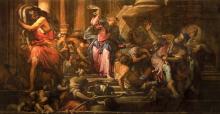
When Christ Went to the Temple
LLANGLOFFAN 7.6.7.6 D (“Rejoice, Rejoice, Believers”)
When Christ went to the Temple to worship God one day,
He entered through the courtyard where anyone could pray.
That court was for the nations--and all could enter in.
But Jesus found a market, a shameful robbers’ den.
There, cattle, sheep, and pigeons were sold for sacrifice,
And moneychangers shouted of quality and price.
Outsiders could not enter the inner courts for prayer.
Their only place to worship was in the courtyard there.
...
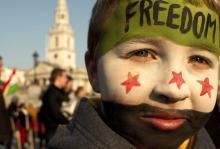
IN JULY 2013 in Raqqa, the first city liberated from regime control in northeastern Syria, a Muslim schoolteacher named Soaad Nofal marched daily to ISIS headquarters. She carried a cardboard sign with messages challenging the behaviors of members of the Islamic State of Iraq and Syria as un-Islamic after the kidnapping of nonviolent activists. After Nofal was joined by hundreds of other protesters, a small number of activists were released. It is a small achievement, but an indication of what communities supported in responsible ways from the outside could achieve on a larger scale in areas controlled or threatened by ISIS.
In the fight against ISIS, unarmed civilians would seem to be powerless. How can collective nonviolent action stand a chance against a heavily armed, well-financed, and highly organized extremist group that engages in public beheadings, kidnappings, and forced recruitment of child soldiers and sex slaves? One whose ideology sanctions the killing of “infidels” and the creation of a caliphate?

The zeitgeist is clear. Much like Emmett Till’s murder in 1955 sparked the civil rights movement, the tragic string of murders of blacks in 2014 catalyzed another movement, the #BlackLivesMatter movement. This movement picks up where the civil rights movement left off, addressing systemic racial injustice in the legal and penal system, educational system, and economic system. In some ways, the battles we fight are more challenging than the ones our grandparents fought. Undeniably, we face off in a more complex world and against forms of systemic racism that are so subtle that they are almost invisible. Nevertheless, due to a unique combination of gifts and experiences, I’m hopeful that my generation of black millennials is ready to lead us on to a more equitable society. Here’s why.
1. We are propelled by the prophetic legacy of the past.
With a technological savvy that gives us unprecedented access to the true history of our people, and as perhaps the last generation to breathe the same air as the civil rights generation, we draw upon the legacies of the past as we move forward. When I sense that my capacity to forgive is waning, I recall my recent conversations with several survivors of the 16th Street Baptist Church bombing in Birmingham, Ala., and I’m reminded of the inner healing that forgiveness promises. When I am tempted to pander to the powers that be, I call my radical granddad and ask him to tell me again about the many Black Panthers meetings that took place at the church he pastored in Berkeley, Calif., in the 1960s. When I feel that I’m losing my courage, I read Ida B. Wells’ autobiography and am reminded that we are not alone. We are connected — part of a chain of black activists, each generation inspiring the next. Our heroes guide us every day.
BORDERED BY strip malls, chain restaurants, and drug stores, four-lane Hillsboro Pike in Nashville, Tenn., carries cars from the Vanderbilt University area out to suburban neighborhoods. Every afternoon, thousands of drivers heading home from the city crest a ridge and pass a long, red-brick church.
That church, Calvary United Methodist, is where I was confirmed, participated in youth group, and sang in the choir. In the archives room off the education wing, a visitor can open a filing cabinet drawer, flip past photos of youth group retreats and church league basketball games, and find a manila folder labeled “Rev. Dr. Sam Dodson, 1958-1965.”
The folder is thin, but its contents are weighty. A letter to the local Methodist bishop from the church’s board explains that Dodson cannot adequately minister to his congregation while participating in political activities and suggests he be demoted to assistant pastor. A newspaper clipping from 1965 announces that Rev. Dodson and his family will be moving to Athens, Greece, where he will head St. Andrew’s American Church. I recognize some of the names signed to letters calling for Dodson’s demotion—an usher who pressed strawberry candies into my palm whenever I asked, a woman who looked me in the eye when I was 11 and told me I would be a leader in the church someday.

It is difficult to understand why people, particularly Christians, view a statement as patently obvious as “Black Lives Matter” as a subject for controversy. However, sometimes the most obvious things still need to be said.
So:
Black lives matter because God made every one of us in God’s image. Black lives matter because the Bible tells us that we are part of a body and the eye cannot say to the hand, “I don’t need you.” Black lives matter because God pays particular care to those crying out under the burden of injustice and oppression.
As people of faith in a neighborhood that has been rocked by protests, tear gas, and arrests, we have sought to stand in solidarity with those who are groaning under the burden of oppression. We offer some physical support — hand warmers, a cup of coffee, an extra pair of socks, but we also offer our presence. The Bible often refers to Christians as “witnesses,” and there is something important about simply standing next to our neighbors in the streets and seeing what is actually happening.
We firmly believe that Jesus needs to be down in the clouds of tear gas and he lets us, his people, participate in his reconciliation by bringing him there with our own two feet. Christians, and particularly evangelicals, need to be in the streets. Our neighbors are just outside our doors, crying out that the system is broken and that our culture doesn’t value the lives of our brothers and sisters. We, as Christians, believe in sin and brokenness and we need to live out our belief that God values all of God’s people even as our culture picks and chooses who is worth caring about.
1. Can the U.S. Ever Figure Out its Messed-Up Maternity Leave System?
“According to the United Nations’ International Labour Organization, there are only two countries in the world that don’t have some form of legally protected, partially paid time off for working women who’ve just had a baby: Papua New Guinea and the U.S.”
2. Post-Evangelicals and Why We Can’t Just Get Over It
Rachel Held Evans pens this spot-on column about identity and why it can be difficult to “simply” ditch the label: “When you grow up believing that your religious worldview contains the key to absolute truth and provides an answer to every question, you never really get over the disappointment of learning that it doesn’t.”
3. This Is What the Oscar Nominations Look Like Without All the Men
A really great visualization.
4. From Lone Wolf to Wolf Packs, What Paris Says About a New Model of Terror
If some interpretations of the recent terrorist attacks hold true, they "point to a dangerous evolution [in] global jihadism: an acceleration in hard-to-detect lone-wolf or wolf-pack attacks that hinge more on the proliferation of an ideology than actual sponsorship by any group.”
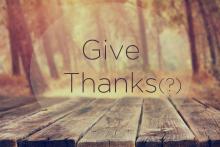
Are you feeling pressure to be thankful?
We are in the midst of the Thanksgiving season. I’m reminded everywhere I go to “Be thankful!”
Well, call me the Scrooge of Thanksgiving, but I’m just not feeling thankful. The more someone tells me to “Be thankful!” the more I feel a sense of despair.
Be thankful? In the midst of Ferguson, Mo.? Jim Wallis writes that, “Many black families woke up this morning knowing that the lives of their children are worth less than the lives of white children in America.” And what will white America do about it? Nothing new. One side will continue the status quo of racism by denying that it even exists and then they will blame the victims. I firmly stand in the other side that blames America’s deeply embedded structures of racism, economic injustice, and educational inequality. To make matters worse, America is sharply divided over the shooting in Ferguson. Each side of the division blames the other for tragic violence. Sunday’s heated debate on Meet the Press between former New York Mayor Rudy Giuliani and Georgetown Professor Michael Eric Dyson is indicative of the deep racial tensions underlying not only Ferguson, but every city in the United States.
My Facebook news feed and the media are telling me how I’m supposed to feel about Ferguson. Outraged. Hurt. Anxious. Guilt. Anger. Bitter. But certainly not thankful.

IN NOVEMBER 1964, as the long Cold War heated up again, this time in Vietnam, Trappist monk Thomas Merton set forth a koan to 14 peacemakers: “By what right do Christians protest?” For three days, these activists and theologians—famously uniting Catholic and Protestant faith traditions—met with Merton in the Kentucky hills, grappling with how and why Christians should resist the violence of war.
Historian Gordon Oyer has re-created this meeting so pivotal to the peace movement and—most important—assessed its meaning for our time. The historic retreat is meticulously sourced with detailed textual analysis of the presenters at the retreat and the writers who influenced them. Particularly impressive is the lucid summary of the era and the delicacy and respect with which the author treats cultural and doctrinal differences among the participants.
Ecumenism in peace work is thankfully common today, but in the early ’60s the blending of faith traditions at the retreat was groundbreaking. Even more revolutionary were the two Masses the group celebrated together, with Jesuit priest Dan Berrigan presiding, everyone in the group receiving communion, and John Howard Yoder, a Mennonite theologian, preaching at the second liturgy. (Both practices were proscribed at the time.)
Attendees included Phil Berrigan, later one of the creators of the Plowshares actions for nuclear disarmament, and A.J. Muste, dean of the U.S. peace movement at the time, with years of experience in War Resisters League, the Committee for Nonviolent Action, and the Fellowship of Reconciliation (FOR). FOR’s Paul Peachey and John Heidbrink were instrumental in initiating and organizing the retreat, although neither of them could attend in the end. (Neither could two other invitees—Bayard Rustin and Martin Luther King Jr.)

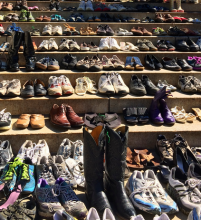
The empty shoes came in all shapes and sizes — cowboy boots and sneakers, children’s sparkly shoes and women’s dress shoes. They filled step after step going up toward the entrance of the Wisconsin State Capitol.
The shoes — 467 pair of them — represented the death toll from guns in just one state: Wisconsin.
"I want you to look at these empty shoes," Jeri Bonavia, told the crowd gathered on the Capitol steps on Monday. "I want you to bear witness. All across our state, families are aching with emptiness."
Bonavia is the executive director of the Wisconsin Anti-Violence Effort, which is using this display of empty shoes in five cities around the state this week.
In the nationwide scheme of things, Wisconsin has a lower death rate from guns than the nation as a whole. The annual average of 467 from murder, suicide and accidents is just a fraction of the approximately 30,000 gun deaths each year across the U.S.
And yet the row upon row of empty shoes on the steps spoke to the heartache that comes with each death, whatever the toll in whatever state.
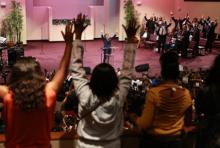
ST. LOUIS — Justice was a recurring theme as thousands of mourners packed the mammoth Friendly Temple Missionary Baptist Church on Monday for the funeral of Michael Brown, a black teen whose fatal shooting following a confrontation with a white police officer set off weeks of sometimes violent protests.
The Rev. Al Sharpton, among the speakers, called for a “fair and impartial investigation” into the shooting.
“We are not anti-police, we respect police,” Sharpton said. “But those police that are wrong need to be dealt with just like those in our community who are wrong need to be dealt with.”
Benjamin Crump, a lawyer representing Brown’s family, alluded to the “three-fifths” clause in the Constitution for counting slaves (which actually was an anti-slavery clause) and demanded that Brown get “full justice, not three-fifths justice.”
Brown’s body was being laid to rest, but the controversy surrounding the Aug. 9 shooting was far from over. Prosecutors have not determined whether the Ferguson police officer, 28-year-old Darren Wilson, will face charges in Brown’s death.